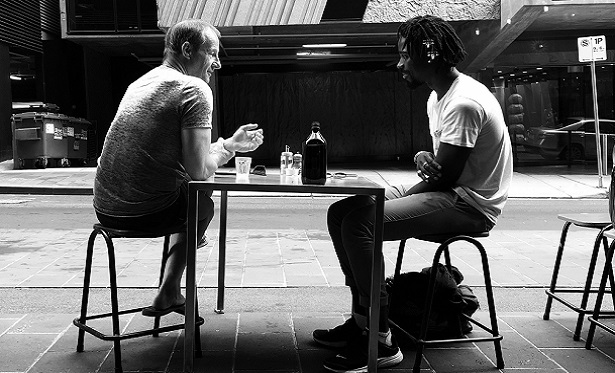How to check in if you’re worried about a friend’s mental health
Date: Thursday 15 Apr 2021
We’re better at knowing mental health matters, but we’re not necessarily better at opening up or listening to what happens when someone does. The Guyliner asks the experts how to be there for the people you love

Cast your mind back over the past year, or even further, and ask yourself: how many times have you answered the question “How are you?” totally honestly? Like, other than reaching for the standard “fine” or “not bad”? Maybe you’ve had occasion to reply with “pretty good”, but more often than not, when someone asks how we’re doing, we lie or downplay it because… well, how long have you got?
“How are you?” has become less of a genuine enquiry into someone’s wellbeing and more of a “hello plus” – the accompanying concern is one of looking polite, not an invitation to spill innermost secrets and troubles, or a go-ahead to get your phone out and show your holiday snaps. (Remember holidays?)
No big deal, you might think; life can’t be one long confessional or personalised therapy session with the rest of the world your understanding shrinks. But successive campaigns to destigmatise mental health issues have told us to be more open about mental health and, crucially, ensure we check in on pals to make sure they’re not struggling. It’s a nice idea, but you have to wonder how these conversations can ever start, and who deals with the fallout. Mental health services are stretched, with long waiting lists for referrals; private therapies can be prohibitively expensive.
Until help is freely available, campaigns create bottlenecks; people with early rumblings of problems might stay quiet to leave services clear for those who “really need it”, meaning issues build up over time. And as much as campaigns and revelations by celebrities attempt to destigmatise mental health issues, the real world looks different. Many still worry that speaking up will change how people look at us. We tell people to talk, but not how to react – and it’s usually other people standing in the way of destigmatisation.
Before the pandemic, many of us lived diary-dependent lives. The death of spontaneity meant meticulously planned catch-ups became exchanges of facts, not feelings. It’s harder to settle into comfortably chatting personal stuff if you’re busy swapping news bulletins on significant life events. So, how do we coax the truth out of our mates? We can dash off a “how r u?” and a vague promise of a pint someday, but, for me, the path into getting deeper isn’t firing off a questionnaire about their state of mind, but talking about everyday, general stuff to help gauge where their head’s at. Text over something silly or funny or a reaction to what you’ve seen on the news. Skip “hello” and “how are you” – they’re a diversion. Resist “catching up on news”.
WE TELL PEOPLE TO TALK, BUT NOT HOW TO REACT – AND IT’S USUALLY OTHER PEOPLE STANDING IN THE WAY OF DESTIGMATISATION
The quality of the check-in makes it meaningful. Often we talk ourselves out of getting in touch, assuming people are too busy or sick of the sight of us or that we have no decent news to share. Don’t be afraid to make the first move – your friend could be desperate to call, or shutting themselves away, heavy with loneliness. Assume all contact is welcome until you get a plain-speaking command to buzz off. Send the message, have the Zoom – even if it’s planned for only ten minutes.
As much as we suffered video-call fatigue during the pandemic, there’s something about taking textual interactions face-to-face that made us feel better connected, right? Let someone see your face, show them you’re out there somewhere. Hearing one’s voice out loud, to see what you’re saying register on another’s face (or in your mentions), makes you feel seen, reminds you you’re alive.
If you want to know how someone really feels, don’t ask them – get them to tell you what they’re loving and hating. Show them you’re interested and where their head’s at should become obvious. New biscuit ranges; Line Of Duty conspiracy theories; Twitter beefs between shared nemeses; new music; trends they’d usually be all over; your last great sandwich; a crappy pun you saw somewhere; a picture of a dog. There is emotion to be found among the ephemera. Obviously, not caring about Harry Styles’ Grammys outfit isn’t necessarily a sign of a mental health spiral, but look out for things that usually bring them joy totally flatlining.

According to therapist and Counselling Directory member Marteka Swaby, in person is even better. “Suggest meeting for a coffee or make an excuse to pop round,” she says. “It can be difficult to pick up on any changes over text, especially if they’re more subtle changes.” Of course, in the socially anxious 2020s, where we don’t answer the doorbell unless we know someone’s coming, you may shrink away from “popping round” or worry it will make things worse, but it’s worth a try.
Consider a bribe: say you have something for them, a book to lend, something you made (is banana bread still a thing?), or that you want their opinion on something. Talking around a problem, about all kinds of inanities, can be as therapeutic as spilling your guts. It doesn’t matter what you talk about: the contact is the key. If somebody’s distancing themselves and not answering texts or taking calls, this may be a sign they’re feeling depressed and withdrawing from the world.
THE PATH INTO GETTING DEEPER ISN’T FIRING OFF A QUESTIONNAIRE ABOUT THEIR STATE OF MIND, BUT TALKING ABOUT EVERYDAY, GENERAL STUFF TO HELP GAUGE WHERE THEIR HEAD’S AT
Some think that sharing your own troubles helps others open up, but I’m a little on the fence about this, in case it derails the conversation and centres on you, not the friend you’re helping. That said, there’s nothing wrong with showing vulnerability; your friend could see you in a new light and feel compelled to share.
Swaby reckons talking about problems in the third person helps. “I often share scenarios of ‘a friend’ I’m trying to help and ask what they would do or what advice they’d give. It feels less intrusive,” she says. “Often people say, ‘I can relate to this’ or ‘This happened to me,’ but it also gives you an insight into how they’d like to be approached in a similar scenario.” Don’t worry if your acting skills don’t stretch that far. “Don’t feel like you have to do something spectacular,” says Swaby. “Sometimes just being there is enough.”
Now the next fire to fight: they begin to share, but chances are we’re unqualified to deal with it. We might panic or worry we’ll say the wrong thing. It’s human nature to try to fix problems landing at our feet, but remember, when someone tells you they’re struggling, they’re often looking for a sounding board rather than a list of solutions. Tell them you get it, that you understand (even if, right now, you don’t – you can always do some googling later). To feel heard and understood helps validate someone’s experiences and feelings, so the best way to react might be not to offer advice or opinions unless specifically asked.
Obviously if you have a simple, workable answer to whatever’s happening, ask their permission to offer it. Even taking away the smallest worry a friend might have is still helping them, as it’s one less stress for the pile. “In the short term, it’s helpful to provide reassurance that they’re doing well and that even though they may not be exactly where they want in life, they’re on a journey and you value them and can see how far they have come,” says Swaby. “Building someone up when they lack self-esteem or confidence can feel supportive and help people keep on going. Be your friend’s cheerleader and encourager.”
That said, you can’t force someone to open up to you; they may be working themselves toward it in their own way. They may even be totally fine but embarrassed to share in case they look like they’re bragging in a world that’s looking pretty fried at the moment. As Swaby reminds us, “It’s worth remembering sometimes people are not ready to talk about their mental health and that is perfectly OK too.”
The important thing is to stick around and keep talking. Be there, shoot the breeze, make every conversation inconsequential, featherlight garbage. Talking about nothing still means something. The truth comes when you’re least expecting it. Be ready.
More from GQ Magazine Here

